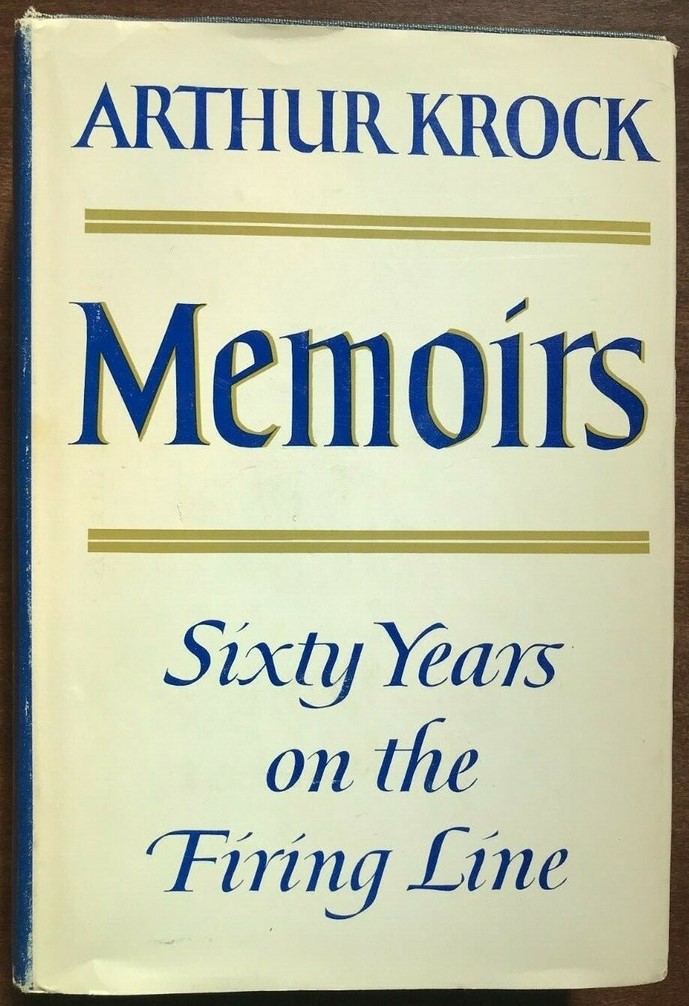Arthur Krock, Memoirs: Sixty Years on the Firing Line (1968)
Arthur Krock was a Pulitzer Prize winning American journalist who inadvertently helped to kickstart Robert Menzies’s landmark Forgotten People radio series.
The series debuted on 9 January 1942, and its original premise was not for Menzies to wax lyrical on political philosophy, nor even to weigh in on Australian domestic political debates. Rather, in the immediate aftermath of Japan’s entry into World War II and with her rapid series of military successes, people were tuning in to hear what this recently removed war leader had to say about events as they occurred. In the hope that he could offer a more informed opinion than regular media commentators, and also a more candid perspective than those who were still bearing the burden of political office. Newspaper advertisements in particular emphasised the fact that Menzies had discussed war matters in detail with both ‘Mr. Churchill and President Roosevelt’, and could therefore offer rare insight.
But what might have been a localised program quickly exploded onto the global stage, after Krock published an article in the New York Times on 11 January, which took aim at both Menzies and British Air Chief Marshall Sir Robert Brooke-Popham for the vulnerability of Singapore. The article had some factual errors, including that Menzies had been appointed as Australia’s new High Commissioner in London, and also that Menzies had been a strong supporter of sending Australian troops to Greece when Churchill had some hesitation (when in fact the opposite had been true). Menzies responded within hours, telling the Monday 12 January edition of Melbourne’s Herald (which was published in the evening, allowing a near-immediate retort) that Krock was wrong, and that he would give a full response in Friday’s broadcast.
There was thus considerable anticipation (and presumably increased listenership, particularly on the Columbia network which relayed the broadcasts to the United States) for Menzies to explain ‘Why aren’t there more aeroplanes in the Far-East?’. In the broadcast, Menzies attacked ‘our chronic desire that someone else should be sacked when something unpleasant happens to us’ which facilitated the ‘fifth-column technique… [of] constant whisper against the honesty and capacity of those who lead us’. He defended Brooke-Popham, who he insisted was no ‘light-hearted optimist’, but instead someone who had warned of the weakness of Singapore, which was precisely why Menzies had gone to Britain to lobby Churchill over the issue. It was the Service Chiefs in London who had taken ‘a more modest view of the requirements for Singapore and Malaya than those on the spot’, but the real blame was collective, to be shared across the democratic world. While Germany and Japan had been preparing for war for years, in Britain and Australia in 1935 any significant increase in defence spending ‘would have been regarded as a piece of war-mongering hysteria’. In essence almost everyone had been an ‘appeaser’ and not taken the threat of conflict seriously enough, and Menzies implored to his listeners ‘why on earth shouldn’t we be honest with ourselves about such matters?’
It was a heartfelt plea for self-reflection and a theme he would pick up on later in the series; that democracy imposed a great responsibility on each individual voter and that responsibility needed to be taken more seriously. Indeed, even in this broadcast he asked his listeners ‘what would you have done?’ if you had been the one allocating limited resources between ‘where hundreds of thousands of troops – including many thousands of Australians – needed air backing at once, or, you could build up air strength where there was no actual fighting but where there might be against a Nation which might become your enemy’.
Menzies was not just defending himself and Brooke-Popham, he was weighing in on a global conversation that was happening with remarkable rapidity and candidness across the democratic world. Not only was much of his broadcast printed as an article in the London and New York Times, but several members of Britain’s House of Lords are on record in Hansard as citing his views. It was not enough to save the reputation Popham, who had already been dismissed and has since since been the subject of a biography entitled “The man who took the wrap”, but it gave an immediate boost in interest for Menzies’s radio series. Newstand magazine The Wireless Weekly was quick to seize upon it, updating its ads to include that Menzies was broadcasting not just on 2UE but a ‘chain of stations throughout the Commonwealth’ and that ‘Press reports and B.B.C. comments on his talks indicate forcibly that what Mr. Menzies says, is NEWS!’
Menzies copy of Krock’s memoir is of added interest, because it was sent to him by Thomas Dewey, the Republican candidate for the 1948 US Presidential election, who became one of Menzies’s long-standing friends.
You might also like...
Sign up to our newsletter
Sign up for our monthly newsletter to hear the latest news and receive information about upcoming events.


